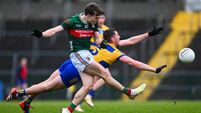Could Sam be snatched this year by a ‘bolter’?

Mayo and Galway fans making their way into MacHale Park for the recent Connacht SFC final. Attendances at this year's finals have suggested the provincial championships still hold a particular appeal among GAA supporters. Picture: INPHO/Ryan Byrne
For the final time, the football championship group stage will begin this weekend. The much maligned format – first introduced in 2023 – will cease at the end of this campaign with Congress deciding to introduce something resembling the old qualifier format for next season.
There has been a lot of tinkering with the format of football's blue riband competition over the last 25 years, but the group stage format has had its benefits. It has provided for some good match ups, novel pairings with more matches in better conditions and, in all cases, good form in the group stage has led to success at All-Ireland level.
Kieran McGeeney even branded the format the “best ever”, saying earlier this year that “every point was important” in the group stage as “right up until the last game, you could be sitting top, you lose the last game and you could be down to third. It's nonsense [changing the format again].” A major sticking point, though, has been the idea of just four teams being eliminated once all group games have concluded.
Somewhere in the middle is probably about the right assessment of the group stage format; it happened, but it won't be an overly memorable period in the annals of the football championship.
Ironically, this year's group stage comes following a provincial series that produced more enjoyable fare for the neutral than in recent years. Are we witnessing a bit of a renaissance for the traditional way of going about things? It may be premature to jump to that conclusion, but it is noticeable that in three of the four provinces where the final pairing was a genuinely competitive affair, crowd numbers were significantly ahead of last year's championship finals.
The Castlebar showdown between Galway and Mayo attracted 27,127 punters, compared to 19,193 for the meeting of the same two counties in Salthill twelve months previously. The Leinster final's novel pairing of Louth and Meath brought over 65,000 supporters to Croke Park, almost three times the attendance at last year's fixture between the Wee County and Dublin. Those in the northern province will say there's very little wrong with the Ulster Championship and they are correct. Almost 29,000 people paid into Clones last year for Donegal's joust with Armagh and this year, around the same number did likewise.
And, even down south, Kerry's facile win over Clare brought out 13,181 supporters to Killarney, which, although a very modest figure, was still more than the 12,059 that watched the same two sides play in Ennis the year previously. More worryingly, as pointed out in the last week, more people attended the drawn 2015 Munster final between Cork and Kerry than attended the all of the matches in the province put together this year (33,491).
But, by and large, the provincial championships did go some way to capturing the imagination of supporters this season. Now, it's time for the All-Ireland series to do the same.
We may be in for the most exciting summer in some time in football, with the championship primed for a bolter from the pack. There are the leading contenders for the All-Ireland (Galway perhaps chief among them now), but with Dublin no longer way out in front, everyone else is jostling for position. The gap between the favourites and the chasing pack has rarely been closer.
In terms of depth of quality, Galway look the market leaders right now with Donegal, Armagh, Kerry and Dublin the teams immediately behind. But there's little more than a cigarette paper between the rest of them.
Questions abound about how counties will respond after the early season fare.
There has been and is again this week, more in-depth analysis of the Mayo situation elsewhere in these pages but, from the outside looking in, there seems to be a sense of real deflation at losing the Connacht final and, perhaps more significantly, the manner of the defeat.
Mayo are not far away and, if they click, can take down any team in the country. But belief has to have been rattled by the latest reversal at the hands of Galway. Cavan this weekend represents a decent opportunity for Kevin McStay's side to get themselves back on track and get rid of some of the dirty diesel from the Connacht Championship. The real litmus tests lie beyond this weekend.
Galway v Dublin is a really tasty tie in Salthill, where the Dubs are primed to get a result. Don't forget, Galway may still be without the services of Damien Comer and Shane Walsh, while John Maher is also nursing a knock. Dublin, on the other hand, are poised to welcome back up to half a dozen players over the coming weeks and they are a wounded animal. That's a dangerous game for the Tribesmen but, on the flip side, it's a good chance for them to underline their All-Ireland credentials.
Down and Clare is an interesting match-up as it will likely be the game which decides which of those two teams advances to the knockout phase. For either, that represents a very solid season. Elsewhere in that group, though, lies the team poised to make the biggest impact over the coming months.
Monaghan are a side that has been brewing quietly over the last few months. Threatened with a fall-off after the retirement of several key players in recent seasons, the Farney men have gone about their work in a business-like manner, taking care of promotion from Division Two with relative ease. Most impressively, they chalked up some big scores along the way and were, by some distance, the highest scorers across any of the four divisions.
They tick a lot of the boxes. Rory Beggan offers variety from his kickouts and a reliable boot for long-range two-point frees. Conor McCarthy, Dessie Ward and Jack McCarron have all shown themselves capable of registering big personal tallies under the new rules and, in Stephen O'Hanlon and Micheal Bannigan, they've got some real pace.
Placed in the most forgiving group of the four, it gives Monaghan a chance to warm to their task before ramping things right up for a potential crack at one of the favourites in an All-Ireland quarter-final. They could be the bolter from the pack this summer.




